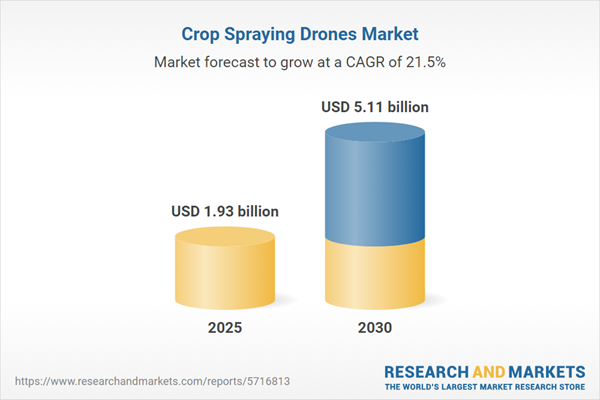The crop spraying drones market in the United States is witnessing robust growth, driven by the increasing adoption of unmanned aerial vehicles (UAVs) for precision agriculture. These drones enhance agricultural efficiency, crop yield, and growth monitoring by applying pesticides with precision and leveraging advanced sensors and imaging technologies to provide detailed field insights. The market is propelled by heightened awareness of the environmental and health impacts of traditional pesticide use, alongside supportive government initiatives, rising drone registrations, and technological advancements.
Market Drivers
A key driver of market growth is the increasing integration of drone technology into farming practices, supported by government initiatives. In August 2023, Central State University received USD 598,814 from the USD A's National Institute of Food and Agriculture (NIFA) to advance unmanned aerial systems education, develop new courses, and provide practical teaching materials, strengthening research and adoption in agriculture. The surge in drone registrations also plays a pivotal role, with the FAA reporting approximately 352,222 recreational and 506,635 commercial drone registrations in 2023, reflecting growing adoption among farmers and agribusinesses. This trend addresses labor shortages and enhances efficiency, with drones offering a cost-effective alternative to traditional spraying methods. According to the American Farm Bureau Federation, farmers using drones achieve a return on investment of USD 12 per acre for corn and USD 2-3 per acre for soybeans and wheat, underscoring their economic benefits.Technological Advancements
The market is further driven by innovative product launches that enhance drone capabilities. For instance, advancements in drone design, such as improved sensors and GPS systems, enable precise pesticide application, reducing waste and environmental impact. These technologies allow farmers to monitor crop health, detect issues like pest infestations, and optimize resource use, aligning with the growing demand for sustainable farming practices. The focus on precision agriculture, supported by real-time data and advanced imaging, continues to drive adoption among large farm owners seeking to maximize productivity.Geographical Outlook
The U.S. market is a key growth hub, fueled by the increasing use of drones in precision agriculture and significant investments in research and development. Large farm owners are leveraging drones to enhance efficiency in expansive fields, particularly in challenging terrains where traditional equipment is less effective. The established precision-farming ecosystem and regulatory clarity in the U.S. further support market expansion, positioning North America as a leading region for crop spraying drones.Challenges
Despite the positive outlook, challenges such as high initial investment costs and regulatory complexities surrounding drone operations persist. The lack of clear pesticide labeling for drone use in the U.S. also poses a hurdle, as current labels often do not specify drone application guidelines. Addressing these barriers through regulatory updates and cost-effective solutions will be critical for broader adoption.The U.S. crop spraying drones market is poised for steady growth, driven by government support, rising drone registrations, and technological innovations. With a focus on precision agriculture and sustainability, drones are transforming farming practices by improving efficiency and reducing environmental impact. Continued investments in research, supportive policies, and advancements in drone technology will further accelerate market expansion, making crop spraying drones a vital tool for modern agriculture.
Key Benefits of this Report:
- Insightful Analysis: Gain detailed market insights covering major as well as emerging geographical regions, focusing on customer segments, government policies and socio-economic factors, consumer preferences, industry verticals, and other sub-segments.
- Competitive Landscape: Understand the strategic maneuvers employed by key players globally to understand possible market penetration with the correct strategy.
- Market Drivers & Future Trends: Explore the dynamic factors and pivotal market trends and how they will shape future market developments.
- Actionable Recommendations: Utilize the insights to exercise strategic decisions to uncover new business streams and revenues in a dynamic environment.
- Caters to a Wide Audience: Beneficial and cost-effective for startups, research institutions, consultants, SMEs, and large enterprises.
What do businesses use our reports for?
Industry and Market Insights, Opportunity Assessment, Product Demand Forecasting, Market Entry Strategy, Geographical Expansion, Capital Investment Decisions, Regulatory Framework & Implications, New Product Development, Competitive Intelligence.Report Coverage:
- Historical data from 2020 to 2024 & forecast data from 2025 to 2030
- Growth Opportunities, Challenges, Supply Chain Outlook, Regulatory Framework, and Trend Analysis
- Competitive Positioning, Strategies, and Market Share Analysis
- Revenue Growth and Forecast Assessment of segments and regions including countries
- Company Profiling: Strategies, Products, Financial Information, and Key Developments among others
Segmentation:
By Type
- Fixed Wing Drone
- Rotary Blade Drone
- Hybrid Drone
By Power Source
- Electric Powered Drones
- Fuel/Gasoline Powered Drones
- Hybrid Powered Drones
By Application
- Crop Spraying
- Fertilizer Spreading
- Pest Control
- Multi-function
By Geography
- North America
- South America
- Europe
- Middle East and Africa
- Asia Pacific
Table of Contents
Companies Mentioned
- SZ DJI Technology Co., Ltd.
- XAG Co., Ltd.
- Fly Dragon Drone Tech
- Prodrone Co., Ltd.
- HSE – UAV
- Aero360
- ASTA Technology Co., Ltd.
- Shenzhen GC Electronics Co., Ltd.
- Yamaha Motor Co., Ltd.
Table Information
| Report Attribute | Details |
|---|---|
| No. of Pages | 142 |
| Published | August 2025 |
| Forecast Period | 2025 - 2030 |
| Estimated Market Value ( USD | $ 1.93 billion |
| Forecasted Market Value ( USD | $ 5.11 billion |
| Compound Annual Growth Rate | 21.5% |
| Regions Covered | Global |
| No. of Companies Mentioned | 9 |









